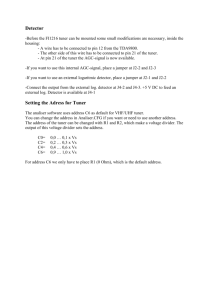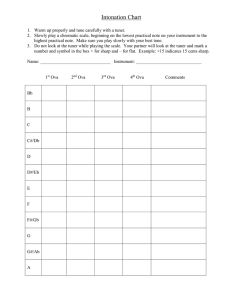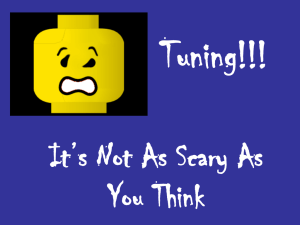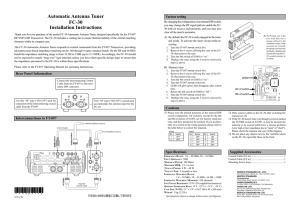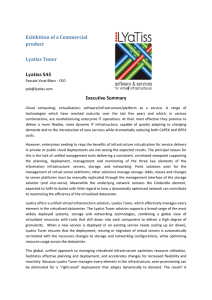AT-180 Automatic Antenna Tuner
advertisement
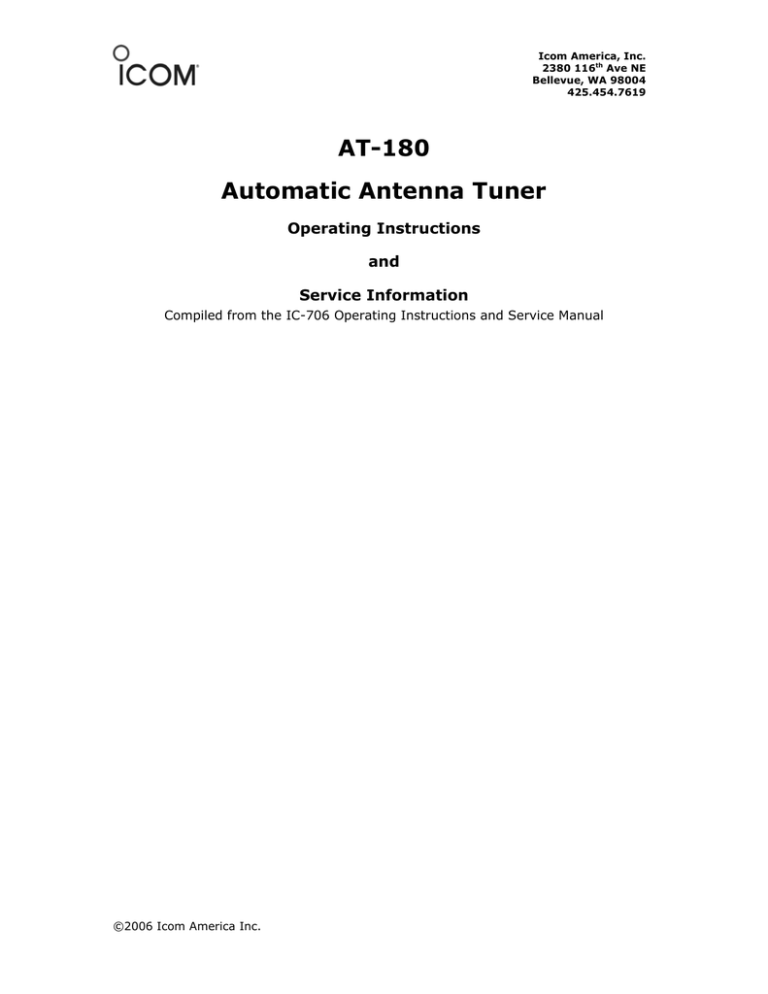
Icom America, Inc. 2380 116th Ave NE Bellevue, WA 98004 425.454.7619 AT-180 Automatic Antenna Tuner Operating Instructions and Service Information Compiled from the IC-706 Operating Instructions and Service Manual ©2006 Icom America Inc. IC-706MKIIG.qxd 4 02.3.27 13:53 Page 27 RECEIVE AND TRANSMIT D Optional AT-180 AUTOMATIC ANTENNA TUNER The AT-180 automatic antenna tuner matches the IC706MKIIG to the connected antenna automatically. Once the tuner matches an antenna, the variable capacitor angles are memorized as a preset point for each frequency range (100 kHz steps). Therefore, when you change the frequency range, the variable capacitors are automatically preset to the memorized point. C A U T I O N : N E V E R transmit with the tuner ON when no antenna is connected. This will damage both the transceiver and the antenna tuner. Note: • The AT-180 cannot be used for the 144/430 MHz band. • When operating on the 144/430 MHz band, pushing the tuner switch selects the call channel (p. 39). • The AT-180 can match both HF and 50 MHz bands. However, operation is different for the HF and 50 MHz bands. TUNER OPERATION • For the HF band: Push [TUNER] to turn the tuner ON. The antenna is tuned automatically during transmission when the antenna SWR is higher than 1.5:1. • When the tuner is OFF, the [TUNER] light goes out. [TUNER/CALL] Lights to indicate the AT-180 is turned ON. • For the 50 MHz band: Push and hold [TUNER] to tune the antenna. If the [TUNER] light flashes slowly while transmitting, push and hold [TUNER] again to re-tune the antenna. [TUNER/CALL] Flashes to indicate re-tuning is necessary. 27 operation MANUAL TUNING During SSB operation on HF bands at low voice levels, the AT-180 may not be tuned correctly. In such cases, manual tuning is helpful. Push and hold [TUNER] for 1 sec. to start manual tuning. • CW mode is selected, a side tone is emitted, and the [TUNER] light flashes; then, the previous mode is selected. [TUNER/CALL] Push and hold for 1 sec. to start manual tuning. If the tuner cannot reduce the SWR to less than 1.5:1 after 20 sec. of tuning, the [TUNER] light goes out. In this case, check the following: • the antenna connection and feedline • the antenna SWR (p. 26; meter function) T h r o u g h i n h i b i t (HF bands only) The AT-180 has a through inhibit condition. When selecting this condition, the tuner can be used at poor SWR’s. In this case, automatic tuning in the HF bands activates only when exceeding SWR 3:1. Therefore, manual tuning is necessary each time you change the frequency. Although termed “through inhibit,” the tuner will be “through” if the SWR is higher than 3:1 after tuning. CONVENIENT • T u n e r s e n s i t i v e c o n d i t i o n (HF bands only) If you require critical tuning at any time during transmission, select the tuner sensitive condition. See p. 55 for selection. • A u t o m a t i c t u n e r s t a r t (HF bands only) If you want to turn OFF the tuner under conditions of VSWR 1.5:1 or less, use “automatic tuner on” and turn the tuner OFF. See p. 54 for turning the function ON and OFF. IC-706MKIIG.qxd 02.3.27 13:53 Page 62 OPTIONAL INSTALLATIONS/SETTINGS 10 ■ AT-180 internal switch description The optional AT-180 has 3 operating conditions for HF band operation. Select a suitable condition according to your antenna system. ➀ Remove the top cover of the AT-180. ➁ Set the tuner switches to the desired positions according to the table below. S1 S W Position Operation The tuner operating condition is set by S2 A (default) described below. THROUGH INHIBIT The tuner tunes the antenna even when the antenna has poor SWR (up to VSWR 3:1 after tuning). In this case, manual tuning is necessary each time you change the frequency although the tuner automaticalB ly starts tuning when the VSWR is higher than 3:1. This setting is called “through inhibit,” however, the tuner is set to “through” if the VSWR is higher than 3:1 after tuning. S2 C • AT-180 inside top cover S2 S1 D C B A TUNER SENSITIVE CONDITION The tuner tunes each time you transmit (except SSB mode). Therefore, the lowest SWR is obtained at any given time. For SSB mode, the same condition as the “D” position. NORMAL CONDITION The tuner tunes when the SWR is higher (default) than 1.5:1. Therefore, the tuner activates only when tuning is necessary. D • Specifications for the AT-180 • Frequency coverage : 1.9 – 54 MHz • Input impedance : 50 Ω • Maximum input : 120 W power • Minimum tuning :8W power • Matching impedance : 16.7–150 Ω (HF band) range 20 –125 Ω (50 MHz band) • Tuning accuracy : Less than SWR 1.5:1 • Insertion loss : Less than 1.0 dB (after tuning) • Power supply requirements • Dimensions (mm/in) : 13.8 V DC/1 A (supplied from the transceiver’s ACC socket) : 167(W) × 58.6(H) × 225(D) 6 9⁄ 16(W) × 2 5⁄ 17(H) × 8 7⁄ 8(D) • Weight : 2.4 kg; 5 lb 4 oz • Supplied accessories : coaxial cable (1 m), ACC cable (DIN 13 pins) • Connector information for ACC(2) socket 4 2 1 6 5 3 ACC 2 7 PIN NO./ NAME DESCRIPTION ➀8 V Regulated 8 V output. (10 mA max.) ➁ GND Connects to ground. ➂ SEND Input/output pin. Goes to ground when transmitting (20 mA max). When grounded, transmits. ➃ BAND Band voltage output. (Varies with amateur band; 0 to 8.0 V). ➄ ALC ALC output voltage (–4 to 0 V). ➅ NC No connection. ➆ 13.8V 13.8 V output when power is ON (1 A max). 62
